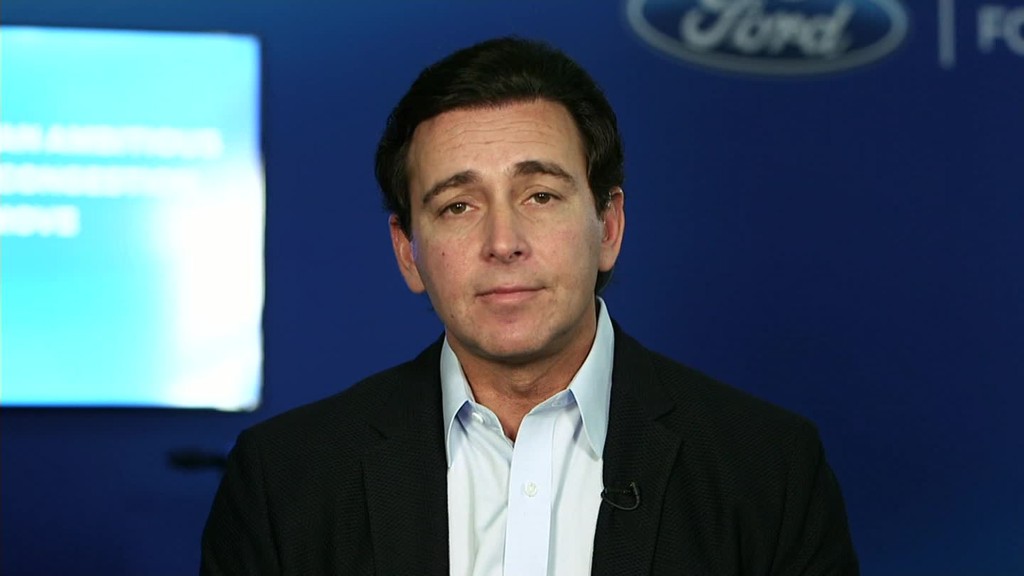
President-elect Donald Trump warns he'll impose big tariffs on goods from Mexico to protect blue collar jobs in America.
But Trump may want to take note of how similar tariffs have played out in Argentina. In 2009, that country put a 35% tariff on computers, tablets and other electronics in order to shield its manufacturing workers. It's the same size as Trump's proposed tariff.
U.S. experts warn that such a steep tariff in America would make imports -- from cars to clothes -- more expensive for the average American.
Argentina's tariff went so badly that the government is ending it starting next year.
The huge tariff did protect Argentine manufacturing workers assembling electronics -- a fairly small industry. But it cost many of Argentina's 44 million citizens dearly, with sky high prices for TVs, computers and cell phones, among other items.
The taxes are so steep that Argentines go next door to Chile to buy electronics, where they are significantly cheaper thanks to Chile's lower tariffs. That has created a massive black market for iPhones in Argentina, where people resell iPhones bought elsewhere.
"Everyone is losing. The only ones who are winning are the people who got the jobs in the industry," says Javier Masoero, a 26-year old software developer who lives in Argentina's capital, Buenos Aires.
Related: The black market for iPhones: Argentina
Masoero went to Chile last year for vacation -- and to buy an iPhone and an Asus Notebook. He saved about $900 by buying in Chile instead of his home country. He believes the tariffs are the chief reason why the price tag is so much higher.
Online, a shopper in Argentina can buy an iPad mini 4 for about $1,260. In Chile a shopper can buy that same iPad for about $640.
On top of steep prices in Argentina, local business owners say the lack of competition gives manufacturers an incentive to produce low-quality products and charge high prices.
"You can't be competitive just by putting tariffs on imports to protect an industry that's not hiring hundreds of thousands of people," says Matias Recchia, CEO of IguanaFix, a start up in Latin America that's similar to Task Rabbit. It pairs workers with customers who need work done.
Related: Controversy brews over Trump Tower in Argentina
Recchia wants the tariff repealed. He believes his 120-employee business will benefit because if more Argentines can buy high-quality TVs at a lower price tag, they will more likely need to pay for installation. The gig workers on Recchia's platform install TVs, among other tasks.
Experts stress that Argentina isn't a perfect illustration of Trump's tariffs. For example, in the U.S., car production crosses the border several times because of supply chains. In Argentina, parts don't crisscross borders as much.
And the motivations behind the tariffs are different. While Argentina solely aimed to protect manufacturing jobs, Trump is also using the threat of tariffs to renegotiate NAFTA, the free-trade deal between the U.S., Canada and Mexico.
Related: These are America's biggest trade partners
Overall, "the impact [of the tariffs] on employment certainly has been very negative," says Santiago Urbiztondo, an economist at the Foundation of Latin American Economic Investigations, a research group in Argentina.
Manufacturers in Argentina warn the government that repealing the tariff on electronics would risk jobs. Economists acknowledge that legitimate concern but they also say that the sky-high prices need to come down. In their view, the protectionist trade policy hasn't worked.
Argentina's economy, which is in a recession, is a relatively closed when it comes to trade. Its average tariff is higher than that of Chile, Mexico, Colombia and Peru, among others, according to the World Trade Organization.
It's not dumping all of its tariffs. Argentina still has high tariffs on other goods like clothes, which are very expensive there.
The fine line between helping consumers and protecting jobs isn't an easy one to navigate.
"You can please one at the expense of the other," says Maria Victoria Murillo, an Argentine professor of political science at Columbia University. "If you put up trade tariffs, consumers will end up paying more."


